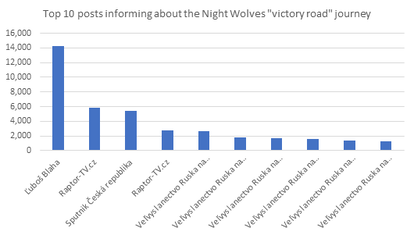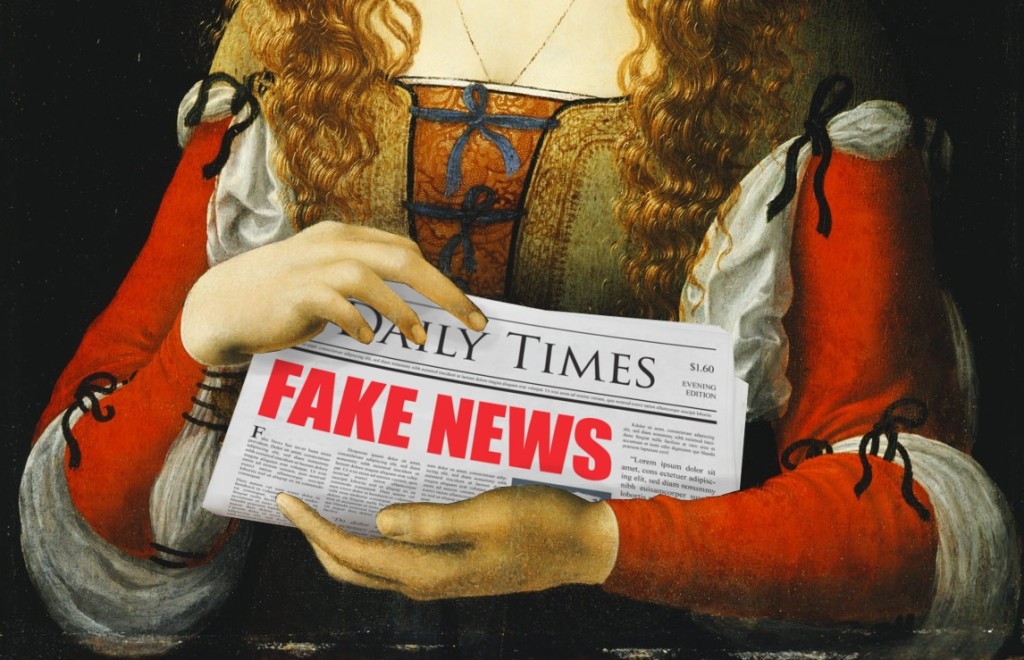This week, as in previous weeks, Infosecurity.sk presents an overview of disinformation trends it has been able to capture over the past two weeks:
1. The pro-Russian disinformation media are using the recent anniversary of the end of the Second World War to spread propaganda, disinform the public, and rewrite history.
2. Their narratives attempt to adapt historical events to fit their anti-Western ideological framework, purposefully ignoring certain facts and labelling anyone who tries to challenge their view as “Russophobic.”
3. The Kremlin’s propaganda in connexion with the commemorations of the end of the Second World War was also reflected in the recent “Victory Road” tour of the Night Wolves biker gang’s sympathizers across Slovakia and the Czech republic.
4. The Night Wolves and their sympathizers abuse the commemorations for propaganda purposes, attempting to rally support for extremist forces and to spread anti-Western narratives.
5. The activities of the Night Wolves and their sympathizers are strongly promoted by the Russian Embassy in Slovakia and serve as a PR event for the Slovak and Czech disinformation scene.
Commemorating the End of the Second World War through Disinformation, Propaganda, Historical Revisionism
May 8 marks the anniversary of the unconditional surrender of Nazi Germany to the Allied Powers, which brought an end to the Second World War in Europe. Therefore, the beginning of May is usually characterized by the remembrance of the fallen and education about the terrible legacy of the war.
However, the 76th anniversary of Europe’s deadliest conflict was also characterized by Moscow’s attempts to spread propaganda, disinform the public, and rewrite history.
The pro-Kremlin disinformation actors have long sought to promote the narrative that portrays the Soviet Union only as a peacemaker and a liberator of Europe from fascism. According to them, Slovak and Czech “Russophobes” are in fact attempting to rewrite history by giving the merits to Americans for liberating Europe, while downplaying Russian merits.
These narratives could have been observed in the official communication of the Russian Embassy in Slovakia as well as in the article by Anna Belousova, a former member of the Slovak parliament and the Slovak National Party, which was published on the pro-Russian disinformation website Extraplus.
The disinformation actors have deliberately overlooked the role played by the USSR at the beginning of the war. Especially the so-called Molotov-Ribbentrop Pact between Nazi Germany and the Soviet Union, based on which the Soviet Union attacked Poland three weeks after Germany and which enabled the two powers to partition Poland after its surrender, has been trivialized and omitted from their narratives.
In addition to Poland, the Soviet Union also invaded and occupied the Baltic countries, a fact that is also often omitted in the Kremlin’s narratives.
Although the Soviet Union has undeniable merit in defeating Nazism, the disinformation media portray a very skewed narrative of this struggle. Their narratives attempt to adapt history to fit their anti-Western ideological framework, ignoring essential facts and context and labelling anyone who attempts to challenge their outlook as “Russophobic.”
Putin’s Biker Gang as a Tool of Hybrid Warfare
In fact, the Kremlin’s propaganda in connexion with commemorations of the end of the World War II also took a more physical form. One example is the recent “Night Wolves” biker gang’s “victory road” journey across Europe. An event heavily promoted by the Russian Embassy in Slovakia, with the alleged aim to pay homage to the fallen heroes who liberated Europe from fascism.
However, experts have repeatedly pointed out that the biker gang is closely linked to the Kremlin and serves as an instrument of hybrid warfare. This is illustrated by the fact that Moscow financially supports the activities of Night Wolves. Moreover, several members of Night Wolves are on the sanctions list and are not allowed to enter the territory of the EU.
The reason is that some of its members even directly participated in the fights in Eastern Ukraine on the side of pro-Russian separatists, for which they were honored by President Putin.
In 2018, the Night Wolves even set up their “European headquarters” in Slovakia, in an agricultural complex converted into a military museum. The museum’s exhibits, which included armored personnel carriers, were then used to train the Slovak paramilitary organisation Slovenskí Branci. The suspicious activities only stopped when the state authorities got involved.
Therefore, the recent activities of the Night Wolves gang in Slovakia and the rest of Europe should be considered a security threat. Particularly threatening is how the gang establishes contacts with representatives of local administrations to organize various cultural events, such as World War II commemorations.
These events are then often misused for propaganda purposes, to amass support for nationalist or extremist forces, and to mobilize the public against the EU and NATO membership.
Unlike in the previous years, the Russian members of Night Wolves did not participate in this year’s “Victory Road” because of the COVID-19 pandemic. However, the local Slovak branch of the biker gang and their sympathizers from both Slovakia and the Czech Republic took it upon themselves to continue their legacy, which prompted various reactions from officials.
Some Slovak government officials, including Defence Minister Jaroslav Naď and the State Secretary of the Ministry of Foreign Affairs, Martin Klus, criticized the event. These state officials stressed that the local Night Wolves sympathizers were victims of Russian propaganda and emphasized the security threat posed by the Russian biker gang, for which they were immediately smeared by the local pro-Russian disinformation media.
The disinformation media, the Russian Embassy and other traditionally pro-Kremlin oriented politicians, such as the Slovak left-wing extremist politician Ľuboš Blaha, heavily promoted the event.
The fact that the Slovak and Czech disinformation actors heavily promoted the “Victory Road” journey, which served as a successful PR event, is illustrated on the data collected using the analytical tool CrowdTangle[1].
We gathered the data by searching for the keyword “Noční Vlci” (Slovak language translation of the “Night Wolves”).

All of the top 10 posts in the past two weeks, which informed about the Nigh Wolves and their journey through Slovakia and the Czech Republic and which scored the highest number of total interactions (likes, comments, and shares,) came either from disinformation actors or from sites that are known for spreading problematic content in the past.
Altogether, as shown in the graph, the top 10 posts were able to reach more than 38,000 interactions on Facebook.
Traditionally, the most popular post was the one by Ľuboš Blaha, who repeatedly ranks as one of the most successful Slovak disinformation actors in engaging with the public on Facebook.
In addition, a livestream hosted by the Czech Facebook page Raptor.cz showing the wreath-laying by the members of the Night Wolves local branch and their supporters at a memorial in the Czech Republic has garnered more than 2,500 interactions and 63,000 total views. The rest of the posts come from the official Facebook page of the Russian Embassy in Slovakia, highlighting its relentless efforts to promote the group’s activities.
The overview of disinformation trends from the previous two weeks shows that Moscow’s propaganda machine can take on various forms through which it seeks to engage with the public, exploit and manipulate historical events in order to spread anti-Western narratives, bolster its public image, and revise history to fit its ideological framework.
[1] CrowdTangle is a tool from Facebook to help follow, analyze, and report on what’s happening across social media. https://www.crowdtangle.com
Written by:
Matej Spišák – a Research Fellow at STRATPOL – Strategic Policy Institute in Bratislava and Editor-in-Chief at Infosecurity.sk
Denis Takács – an Analyst at STRATPOL – Strategic Policy Institute in Bratislava
Project Infosecurity.sk organized by STRATPOL – Strategic Policy Institute and Slovak Security Policy Institute, supported by the Prague office of Friedrich Naumann Foundation for Freedom, continuously monitors the activities of both Slovak and foreign disinformation actors but focuses mainly on the former.
The project activities are built upon daily monitoring of emerging disinformation, hoaxes, and conspiracy theories in the online information space. That allows the analysts to identify disinformation posts and narratives that resonated with the public the most, as well as to find out where they originated, and how they spread and evolved on social media.
This report represents a bi-weekly summary of arising trends in the spread of malicious information content online. Based on that, Infosecurity.sk can warn the public about emerging and current trends in the field of disinformation, manipulation, and propaganda.
The article was originally published at: https://www.freiheit.org/central-europe-and-baltic-states/infosecuritysk-bi-weekly-report-emerging-disinformation-trends-may
Continue exploring:
Infosecurity.sk: Bi-Weekly Report on Emerging Disinformation Trends
Freedom of Press in Greece: Critical Analysis of Index of Reporters Without Borders



